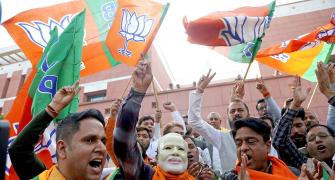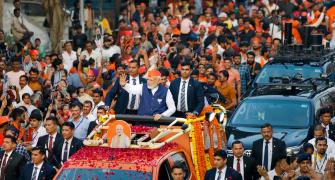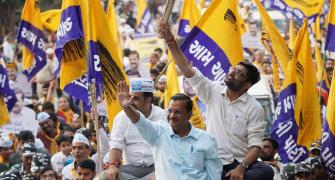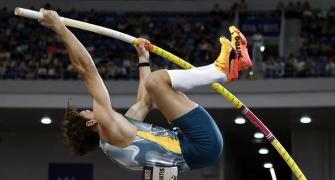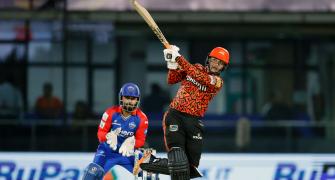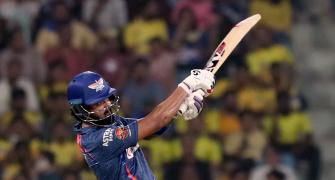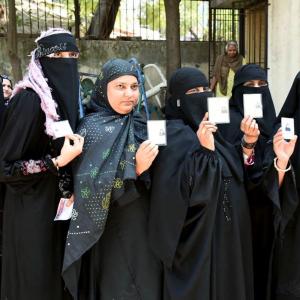'The BJP while being in government in Gujarat continues to campaign like an Opposition party whereas the Opposition does the opposite.'
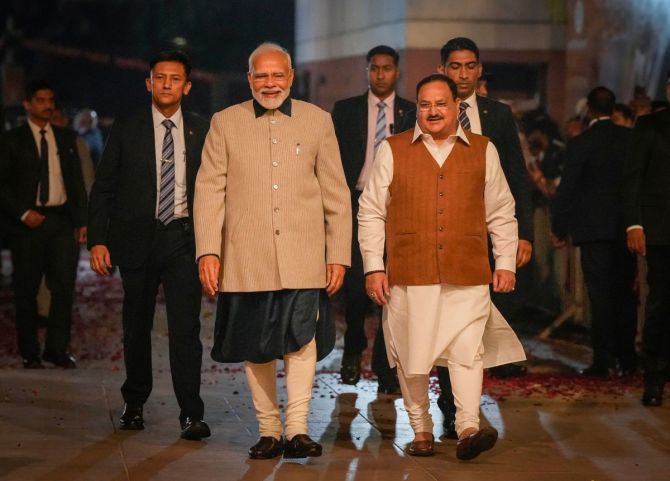
"The connect Gujarati voters have with Prime Minister Narendra Modi is phenomenal. They see him as one of their own when he comes to campaign in the state."
"The Bharat Jodo Yatra has generated some positive traction, but it is not enough to catapult the Congress to revival or regeneration."
"Arvind Kejriwal sees himself as the new national challenger, but it will take some time for him to be able to catapult his party as a challenge."
Dr Rahul Verma, Fellow at the Centre for Policy Research and visiting assistant professor at the department of political science, Ashoka University, discusses the Gujarat, Himachal Pradesh elections and Delhi election verdicts with Rediff.com's Archana Masih.
What are the big takeaways for the BJP, AAP and Congress today?
Each of these parties have somethings to celebrate and somethings to introspect about.
BJP: The party was in power in all three -- Gujarat, Himachal and MCD in Delhi. They won Gujarat convincingly. By the time all the results come out they would have made history by winning their 7th consecutive election. The party will surpass the previous highest seat tally of 149 held by the Congress party's Madhavsinh Solanki in 1985. It's a big victory for the BJP.
The BJP will find some solace that in spite of 15 years of incumbency, they still managed to win 100 seats in the Delhi MCD poll.
The party will be disappointed with the performance in Himachal Pradesh where they were hoping to buck the anti-incumbency.
AAP: The party made a decent entry in the Delhi MCD election last time and have won this time. They have consolidated their hold in Delhi state politics.
They have fallen short of their own expectations of getting around 20 seats in Gujarat, but got a decent vote share of around 12%.
In Himachal, AAP left the campaign midway and got 2% vote share. Therefore, the idea that AAP can burst into a state and make a big entry is something for the party to introspect about.
Congress: It is a silver lining for the party in Himachal Pradesh. But they need to be worried about the result in Gujarat and Delhi.
The Congress ruled Delhi between 1998 and 2013, but it has become a marginal player in the state.
The party needs to be worried about Gujarat because it had a formidable presence with 35%-40% vote, but now the party has come down to around 26%.
In 2017, they gave the BJP a scare, but have done very poorly in 2022.

What do you see as the reason for the Congress' dismal performance in Gujarat? It has gone from 77 seats in 2017 to 17 seats in 2022?
The party's national leadership did not campaign in the state.
They could not mobilise opinion like they did in during the Patidar agitation in 2017.
They could not build a campaign around issues of governance or the Morbi bridge tragedy.
Moreover, the state leadership was left orphaned. Much of the Congress focus was on the Bharat Jodo Yatra.
I also feel the Congress took AAP's entry very lightly. Even though AAP has got around 12% votes, a large portion of those votes must have come from erstwhile Congress voters.
The party thought there was largescale anti-incumbency against the current Gujarat government and they could capitalise on it, but the BJP has increased its vote share from 48% to 53%. Hence, the Congress misread the election in Gujarat.
In the last 5 years, the Congress has had no stable leadership at the state level, hence there are multiple reasons for their dismal performance.

What are the reasons behind the BJP's spectacular win in Gujarat? If you had to point out one turning point that ensured this landslide victory, what would that be?
Gujarat is a one-party dominant state like what Bengal was for the CPI-M till 2011. There is a confluence of factors behind the win:
1. It is presided over by a charismatic leadership. The connect Gujarati voters have with Prime Minister Narendra Modi is phenomenal. They see him as one of their own when he comes to campaign in the state.
2. The phenomenal organisational machinery that the BJP has built over years.
3. Their performance in certain areas of governance which they count as the legacy of the Gujarat government.
4. The Hindu-Muslim axis -- albeit in the background -- continues to benefit the BJP.
5. The inability of the Opposition to put up a strong fight. The Opposition lacked on every indicator mentioned above.
All these factors account for the BJP's domination in the state.

What were these elections about? Ideology, development, jobs, emotions? What was the focal point of the campaign?
It is very rare that elections are centred around a single issue.
Both Gujarat and Himachal Pradesh had a combination of different issues: In Gujarat it boiled down to the Opposition not being able to project any salient issues. The BJP while being in government continues to campaign like an Opposition party whereas the Opposition does the opposite.
Contrary to Gujarat, Himachal Pradesh has had alternating governments every 5 years. The BJP was hoping to reverse that trend much like Uttarakhand, but it did not succeed.
Unemployment, local issues, old versus new pension schemes worked out in favour of the Congress.
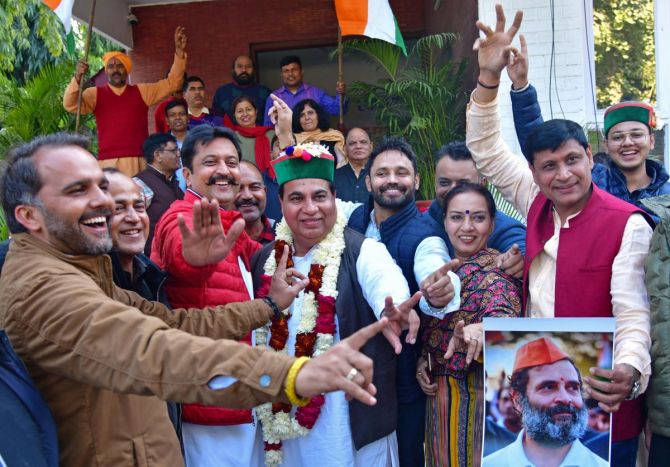
How are these elections likely to impact the assembly elections next year which will see some of the big states going to the polls?
Several Congress versus BJP states are going to the polls next year -- Karnataka, Rajasthan, Chhattisgarh, Madhya Pradesh. Some of these will see tough competition, for example in Karnataka and Chhattisgarh where the Congress has an edge.
In Rajasthan, the party is divided between the Ashok Gehlot and Sachin Pilot factions. In Madhya Pradesh, the BJP is in power and the Congress in disarray.
The Himachal win will give a shot of energy to the Congress because it has not won elections for the past many years.
The BJP, meanwhile, will carry the message that it is in a dominant position in the states that are larger in size.
Both parties have something to rejoice and something to retrospect.

In a two-party state like Gujarat, what draws people to AAP? How is AAP taking away the Congress vote share?
The Congress has been losing elections for many years and hence people would be looking for another alternative.
When the main Opposition party does not campaign like it should, voters will look for another party. In Himachal, the Congress raised the right issues and hence attracted the vote.
AAP has traction on the national level after winning Punjab. If it fights seriously in a state, it will get some votes.

What does this election say about the leaders of the three parties?
Modi remains extremely popular. The road yatra in Ahmedabad was unprecedented. Even in Himachal Pradesh, he made personal calls to rebels. He remains deeply involved in every election that the BJP contests.
Rahul Gandhi hardly campaigned in Gujarat and Himachal Pradesh. The Bharat Jodo Yatra has generated some positive traction, but it is not enough to catapult the party to revival or regeneration.
Arvind Kejriwal sees himself as the new national challenger, but it will take some time for him to be able to catapult his party as a challenge outside Delhi. One must remember that in Punjab, they had an 8-year build-up.
AAP has made an entry into Gujarat. If they can sustain this kind of vote share going forward then in 8-10 years, AAP might be a serious competitor.
AAP is a sort of startup -- it is putting all its energy and its future progress will depend on how sustainable their politics is in these states.
Feature Presentation: Aslam Hunani/Rediff.com

